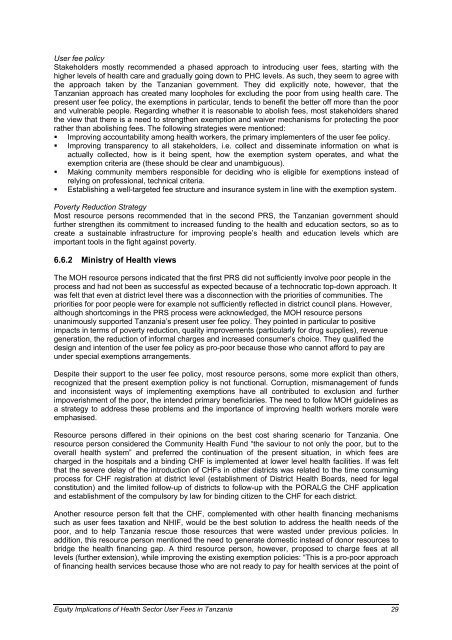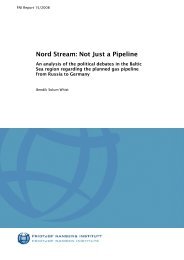equity implications of health sector user fees in tanzania
equity implications of health sector user fees in tanzania
equity implications of health sector user fees in tanzania
Create successful ePaper yourself
Turn your PDF publications into a flip-book with our unique Google optimized e-Paper software.
User fee policy<br />
Stakeholders mostly recommended a phased approach to <strong>in</strong>troduc<strong>in</strong>g <strong>user</strong> <strong>fees</strong>, start<strong>in</strong>g with the<br />
higher levels <strong>of</strong> <strong>health</strong> care and gradually go<strong>in</strong>g down to PHC levels. As such, they seem to agree with<br />
the approach taken by the Tanzanian government. They did explicitly note, however, that the<br />
Tanzanian approach has created many loopholes for exclud<strong>in</strong>g the poor from us<strong>in</strong>g <strong>health</strong> care. The<br />
present <strong>user</strong> fee policy, the exemptions <strong>in</strong> particular, tends to benefit the better <strong>of</strong>f more than the poor<br />
and vulnerable people. Regard<strong>in</strong>g whether it is reasonable to abolish <strong>fees</strong>, most stakeholders shared<br />
the view that there is a need to strengthen exemption and waiver mechanisms for protect<strong>in</strong>g the poor<br />
rather than abolish<strong>in</strong>g <strong>fees</strong>. The follow<strong>in</strong>g strategies were mentioned:<br />
� Improv<strong>in</strong>g accountability among <strong>health</strong> workers, the primary implementers <strong>of</strong> the <strong>user</strong> fee policy.<br />
� Improv<strong>in</strong>g transparency to all stakeholders, i.e. collect and dissem<strong>in</strong>ate <strong>in</strong>formation on what is<br />
actually collected, how is it be<strong>in</strong>g spent, how the exemption system operates, and what the<br />
exemption criteria are (these should be clear and unambiguous).<br />
� Mak<strong>in</strong>g community members responsible for decid<strong>in</strong>g who is eligible for exemptions <strong>in</strong>stead <strong>of</strong><br />
rely<strong>in</strong>g on pr<strong>of</strong>essional, technical criteria.<br />
� Establish<strong>in</strong>g a well-targeted fee structure and <strong>in</strong>surance system <strong>in</strong> l<strong>in</strong>e with the exemption system.<br />
Poverty Reduction Strategy<br />
Most resource persons recommended that <strong>in</strong> the second PRS, the Tanzanian government should<br />
further strengthen its commitment to <strong>in</strong>creased fund<strong>in</strong>g to the <strong>health</strong> and education <strong>sector</strong>s, so as to<br />
create a susta<strong>in</strong>able <strong>in</strong>frastructure for improv<strong>in</strong>g people’s <strong>health</strong> and education levels which are<br />
important tools <strong>in</strong> the fight aga<strong>in</strong>st poverty.<br />
6.6.2 M<strong>in</strong>istry <strong>of</strong> Health views<br />
The MOH resource persons <strong>in</strong>dicated that the first PRS did not sufficiently <strong>in</strong>volve poor people <strong>in</strong> the<br />
process and had not been as successful as expected because <strong>of</strong> a technocratic top-down approach. It<br />
was felt that even at district level there was a disconnection with the priorities <strong>of</strong> communities. The<br />
priorities for poor people were for example not sufficiently reflected <strong>in</strong> district council plans. However,<br />
although shortcom<strong>in</strong>gs <strong>in</strong> the PRS process were acknowledged, the MOH resource persons<br />
unanimously supported Tanzania’s present <strong>user</strong> fee policy. They po<strong>in</strong>ted <strong>in</strong> particular to positive<br />
impacts <strong>in</strong> terms <strong>of</strong> poverty reduction, quality improvements (particularly for drug supplies), revenue<br />
generation, the reduction <strong>of</strong> <strong>in</strong>formal charges and <strong>in</strong>creased consumer’s choice. They qualified the<br />
design and <strong>in</strong>tention <strong>of</strong> the <strong>user</strong> fee policy as pro-poor because those who cannot afford to pay are<br />
under special exemptions arrangements.<br />
Despite their support to the <strong>user</strong> fee policy, most resource persons, some more explicit than others,<br />
recognized that the present exemption policy is not functional. Corruption, mismanagement <strong>of</strong> funds<br />
and <strong>in</strong>consistent ways <strong>of</strong> implement<strong>in</strong>g exemptions have all contributed to exclusion and further<br />
impoverishment <strong>of</strong> the poor, the <strong>in</strong>tended primary beneficiaries. The need to follow MOH guidel<strong>in</strong>es as<br />
a strategy to address these problems and the importance <strong>of</strong> improv<strong>in</strong>g <strong>health</strong> workers morale were<br />
emphasised.<br />
Resource persons differed <strong>in</strong> their op<strong>in</strong>ions on the best cost shar<strong>in</strong>g scenario for Tanzania. One<br />
resource person considered the Community Health Fund “the saviour to not only the poor, but to the<br />
overall <strong>health</strong> system” and preferred the cont<strong>in</strong>uation <strong>of</strong> the present situation, <strong>in</strong> which <strong>fees</strong> are<br />
charged <strong>in</strong> the hospitals and a b<strong>in</strong>d<strong>in</strong>g CHF is implemented at lower level <strong>health</strong> facilities. If was felt<br />
that the severe delay <strong>of</strong> the <strong>in</strong>troduction <strong>of</strong> CHFs <strong>in</strong> other districts was related to the time consum<strong>in</strong>g<br />
process for CHF registration at district level (establishment <strong>of</strong> District Health Boards, need for legal<br />
constitution) and the limited follow-up <strong>of</strong> districts to follow-up with the PORALG the CHF application<br />
and establishment <strong>of</strong> the compulsory by law for b<strong>in</strong>d<strong>in</strong>g citizen to the CHF for each district.<br />
Another resource person felt that the CHF, complemented with other <strong>health</strong> f<strong>in</strong>anc<strong>in</strong>g mechanisms<br />
such as <strong>user</strong> <strong>fees</strong> taxation and NHIF, would be the best solution to address the <strong>health</strong> needs <strong>of</strong> the<br />
poor, and to help Tanzania rescue those resources that were wasted under previous policies. In<br />
addition, this resource person mentioned the need to generate domestic <strong>in</strong>stead <strong>of</strong> donor resources to<br />
bridge the <strong>health</strong> f<strong>in</strong>anc<strong>in</strong>g gap. A third resource person, however, proposed to charge <strong>fees</strong> at all<br />
levels (further extension), while improv<strong>in</strong>g the exist<strong>in</strong>g exemption policies: “This is a pro-poor approach<br />
<strong>of</strong> f<strong>in</strong>anc<strong>in</strong>g <strong>health</strong> services because those who are not ready to pay for <strong>health</strong> services at the po<strong>in</strong>t <strong>of</strong><br />
Equity Implications <strong>of</strong> Health Sector User Fees <strong>in</strong> Tanzania 29













